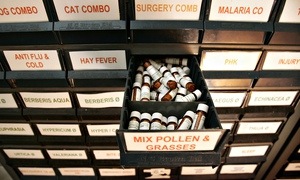The NHMRC has released its final statement on homeopathy. To no ones great surprise, the report concluded that there was no evidence that homeopathy was effective in treating any of 63 separate medical conditions.
I have already dealt with aspects of the interim report, and articles in The Conversation have already dealt with the report in general (see here and here), so I would like to look at it from a different angle; how do we effectively communicate the science behind the report?
Sure, the report is on the web, and has been mentioned in a variety of media and radio programs, but is this going to be effective? The need to effectively communicate these findings is highlighted by two separate occurrences, the recent debate over vaccination in the light of measles outbreaks overseas, and the recent CSIRO report that up to 40% of Australians are “disengaged” or actively distrust science.
After all, the target audience for this information is not the people who have been following the evidence, and are well aware that homeopathy is ineffective. To some degree the people who want to treat mild or self limiting conditions, for example insomnia, and who think that homeopathy is some form of herbal medicine are also not the target audience.
What we are worried about most is those people with serious conditions who abandon standard therapy for ineffective homeopathy (for example, trying to treat diabetes with homeopathic dilutions of uranium salts). We accept that adults should be able to choose (or reject) their therapies. But we also expect that people choose or reject therapies based on the best available evidence. What happens when people reject that evidence?
A recent paper looked at various ways to communicate with parents to increase vaccination rates. They found that parents accepted that the MMR vaccine did not cause significant side effects after the various communication strategies, but were not inclined to get their children vaccinated. One subset of parents, those who had the least favourable views on vaccination at the beginning of the study, were now LESS likely to vaccinate their children.
This is consistent with other studies (see also here) showing that when people with deeply entrenched beliefs are confronted with facts that disprove those beliefs, paradoxically they become firmer in their beliefs.
So how do we effectively communicate the science in the report? The NHMRC site has meticulous information on what they did, summaries and a FAQ, but we have to get people to read them. Most news articles and radio shows do not provide the information to find the report.
From a science communication point of view, most of the information on the NHMRC site is too technical for the general public. As an example of a good way to convey science around a contentious issue, the Australian Academy of Sciences has a great web accessible document that simply and clearly explains the science behind vaccines.
However, if you google “Vaccine Information Australia” you will see 4 of the top 10 results are vaccine denialist sites (and 3 of the top 5), and the AAS report is nowhere to be found.
As well as finding information in a format accessible to the general public, we need to consider that those most at risk of ignoring conventional medicine for homeopathy are also very likely to be in that 20% that the CSIRO found to be disengaged from or distrustful of science. As well, peoples perception of health and their health philosophy can make this a very emotionally charged issue.
We need to carefully consider how to approach this audience. In the light of the pediatrics paper, referenced above, where factual information led people to be less likely to vaccinate, merely giving people the facts is unlikely to be enough.
However, there are a variety of approaches that can be tried. Most of these have been developed in relation to politics or global warming, but the processes that are involved are similar.
In view of how homeopathy may be deeply linked with peoples world views, and showing homeopathy is no more than placebo may leave a gap in peoples beliefs (accounting for their reluctance to accept the facts), an approach such as replacing the gap with an alternative narrative may be the best approach.
Whatever the approach we use, the publication of the NHMRC report on homeopathy is the beginning of a long process of engagement, not the end of the matter.
Ian Musgrave does not work for, consult to, own shares in or receive funding from any company or organisation that would benefit from this article, and has no relevant affiliations.
